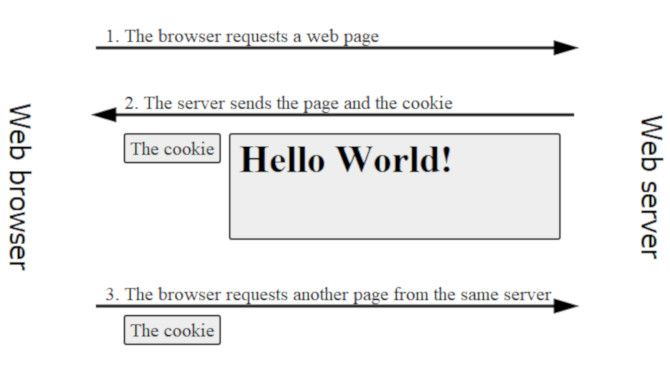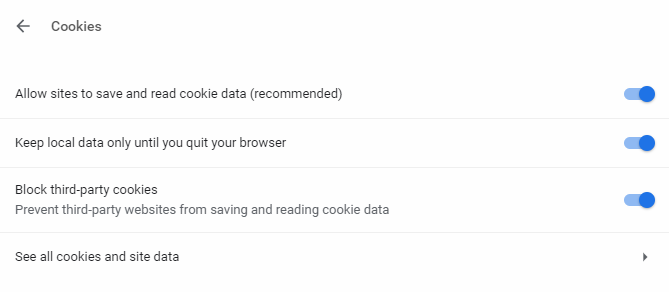Google Chrome’s New Cookies Policy: Everything You Need to Know


- What Are Cookies
- Third-Party Cookies Explained
- Google's New Cookie Policy - FLoC
- Browsers vs. FLoC
Cookies – A word you encounter almost every time you open a web page, surf Facebook, or even chat using an online platform. These files are created the moment you visit a website, and their sole purpose is to store information about a user’s interactions with a certain website. Some are good, some are bad. However, the worst of them all is definitely those we call Third-Party Cookies. In fact, this particular type is why cookies have such a bad reputation among internet users.
Back in 2017, Safari started blocking third-party tracking cookies by default for all users and Firefox followed in its path in 2019. Now, Google Chrome is finally joining its competitors’ counterparts by its competitor’s path by removing third-party cookies forever. So, what’s new with Google’s Cookie policy, and how does it affect users? Find out below.
Cookies – Inside the Crumbs of Data
First, let’s talk about the origin of the name. The word cookie is kind of weird to describe bits of data, and to date, there’s no straight answer on why it’s called that.
A theory states that the word Cookie came from Hansel and Gretel, two characters of our childhood bedtime stories who navigated the forest using Cookie crumbs.
Another theory states that the name came from “Magic Cookie,” which, back in 1979, was a term that reflects a packet of data.
Finally, there’s one reflecting the Andy Williams Show, where Cookie Bear – a character in the show always asks for a cookie, much like what your browser does almost every time.
Thanks to the EU’s GDPR law, all users must agree to cookies that store personal data. Cookies give convenience and efficiency.
By collecting all sorts of information about you when you visit a certain website (browser type, preferences, location, and more), the website you visit another time will enhance your experience.
There are 7 notable types of cookies:
- First-Party Cookies
- Session Cookies
- Secure Cookes
- HTTP-Only Cookies
- Flash Cookies
- Zombie Cookies
Yeah, we did mention six above because the main focus today goes to the ones that give all of them the bad reputation Cookies have nowadays – Third-Party Cookies.
The Bad Guys – Third-Party Cookies
Third-Party Cookies exist in the internet world to track users, period. All they do is collect information about everything you do online, including your online behavior, browsing history, demographics, spending habits, and more.
Such information is very valuable, not only to the user but to advertising networks as well. Using these cookies has become their favorite way to drive up their sales and pageviews.
Third-Party Cookies can be quite frustrating, especially when it comes to privacy. Not to mention that they’re the main reason you get bombarded with unwanted ads all the time.
Now, most browsers, if not all, offer a way for users to block third-party cookies. It’s always recommended that you take the necessary steps in the browser of choice.
Both Safari and Firefox took the necessary actions and started blocking these cookies by default. And now, Chrome is eliminating them altogether.
Google’s New Policy – Enter FLoC
Google will now be targeting ads based on the users’ general interest. It’ll do that using a new AI system that goes by the name of FLoC (Federated Learning of Cohorts), which takes the users’ web history, among other things, and puts them into a certain group based on their interests.
According to Bennett Cyphers, a technologist at civil liberties group the Electronic Frontier Foundation:
“They’re going to get rid of the infrastructure that allows individualized tracking and profiling on the web. They’re going to replace it with something that still allows targeted advertising – just doing it a different way.”
With the new policy, everything will change in the ad industry, especially when we speak of small businesses. The fact is that the new FLoC system will study how users browse and then group them into ‘cohorts.’
As a result, users won’t get ads based on their individual data. Instead, they’ll be served with ones according to what the “Group/Cohort” is interested in as a whole. In other words, advertisers will still target them with ads, but in a more anonymous matter.
When Will It Be Applied?
According to Google, the new policy won’t be applied until 2022. However, they did state that some users will be able to test it out in select countries such as Australia and New Zealand. Here’s the full statement:
“The initial testing of FLoC is taking place with a small percentage of users in Australia, Brazil, Canada, India, Indonesia, Japan, Mexico, New Zealand, Philippines, and the U.S. We’ll expand to other regions as the Privacy Sandbox expands globally. In April, we’ll introduce a control in Chrome Settings that you can use to opt-out of inclusion in FLoC and other Privacy Sandbox proposals. In the meantime, if you’ve chosen to block third-party cookies, you won’t be included in these origin trials.”
For the time being, Google is providing an “origin trial” that’s designed to help websites learn how FLoC works. Also, some users are even testing it on their own.
No Shift in Power
So, why is this challenging for smaller companies? First, many advertisers will have no other choice but to use closed platforms such as Facebook, TikTok, and the likes to target their ads.
Second, with this new mechanism, the powerful players in ad tech could become even more entrenched. That’s because they have all the means to cope with FLoC and what ads to target against them.
In other words, smaller advertisers won’t get their turn to act until efficiency and effectiveness benchmarking by larger companies are released.
Google says that it’s going to give this a try and see how it all turns out. Regardless of the outcome, if ad companies adopt the new policy, it should protect users from tracking attempts and mechanisms that are more intrusive than third-party cookies. We’re referring to the likes of fingerprinting.
Browsers vs. FLoC – A FLoC-ing Complication
While Google shows its best intentions with applying FLoC later on in 2022, no other browser vendor has signaled its intention to support the new policy.
In fact, many privacy-focused browsers such as Brave, DuckDuckGo, and Vivaldi have warned users against Google’s new policy and informed them that they are going to block it on their end. Here’s how each one stands:
DuckDuck Go
The widely popular engine has enhanced tracker blocking on their own Chrome extension in order to block all FLoC interactions on websites. They’re really focusing on fighting the upcoming policy, and they’re not hiding it at all. According to DuckDuckGo:
“It groups you based on your interests and demographics, derived from your browsing history, to enable creepy advertising and other content targeting without third-party cookies. After a short trial period, Google decided not to make this new tracking method a user choice and instead started automatically including millions in the scheme. If you’re reading this in Chrome while logged in to a Google account, yes, that likely means you too, and if not now, then eventually.”
Apparently, DuckDuckGo does not believe that this won’t do users any good. Instead, it’ll bombard them with ads that might slightly relate to them but not at all what they wish to see. Remember, the ads you get are based on what the group you get sorted in likes.
Brave
The open-source web browser has also shown how much they’re against FLoC and how they will block it whenever it gets implemented.
So far, Brave disabled FLoC on the Nightly version of its application, be it on Android or desktop. Below, you can find Brave’s full statement:
“The worst aspect of FLoC is that it materially harms user privacy, under the guise of being privacy-friendly. Others have already detailed many of the ways FLoC is privacy harming. We note here just three aspects of FLoC that are particularly harmful and concerning. Google’s approach to determining whether a FLoC cohort is sensitive requires (in most cases) Google to record and collect that sensitive cohort in the first place! A system that determines whether a cohort is “sensitive” by recording how many people are in that sensitive cohort doesn’t pass the laugh test.”
So, according to Brave’s CEO, Google is not being very transparent when it comes to how it’s marketing its new policy. He did state that FLoC is privacy harming, regardless of Google stating that it’s privacy-friendly.
Google’s New Cookie Policy – Final Words
We don’t know how this shift in Google’s policy will affect us yet. However, we do know that if you’re a regular user, nothing will change when it comes to your experience.
Google’s push to eliminate third-party cookies seems quite weird, considering it alone will have the power over the advertisement. Is it a way to make more money?
Does it really care about protecting the users’ privacy? Only time can tell. What we do know, though, is that it’s going to change online advertising as we know it. If you have any thoughts on Google’s new Cookies Policy, please share them in the comment section below.





